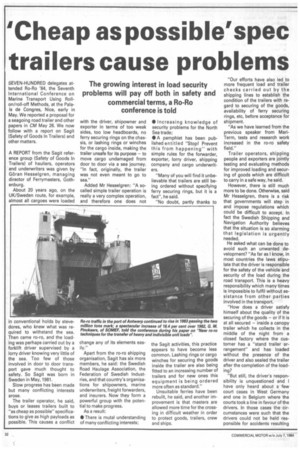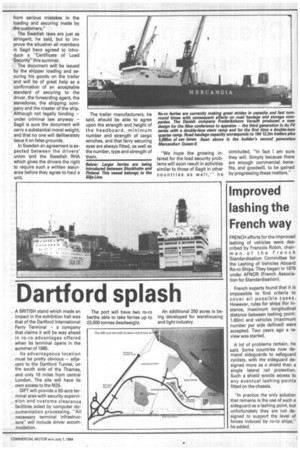'Cheap as possibleispec trailers cause problems
Page 34

Page 35

If you've noticed an error in this article please click here to report it so we can fix it.
SEVEN-HUNDRED delegates attended Ro-Ro '84, the Seventh International Conference on Marine Transport Using Rollon/roll-off Methods, at the Palais de Congres, Nice, early in May. We reported a proposal for a seagoing road trailer and other papers in CM May 26. We now follow with a report on Sagit (Safety of Goods In Trailers) and other matters.
A REPORT from the Sagit reference group (Safety of Goods In Trailers) of hauliers, operators and underwriters was given by Garan Hesselgren, managing director of Ferrymasters, Gothenburg.
About 20 years ago, on the UK/Sweden route, for example, almost all cargoes were loaded in conventional holds by stevedores, who knew what was required to withstand the sea. Then came ro-ro, and the loading was perhaps carried out by a forklift driver supervised by a lorry driver knowing very little of the sea. Too few of those involved in door to door transport gave much thought to safety. So Sagit was born in Sweden in May, 1981.
Slow progress has been made but many conflicting interests arose.
The trailer operator, he said, buys or leases trailers built to "as cheap as possible" specifications to give as high payloads as possible. This causes a conflict with the driver, shipowner and exporter in terms of too weak sides, too low headboards, no ferry securing rings on the chassis, or lashing rings or winches for the cargo inside, making the trailer unsafe for its purpose to move cargo undamaged from door to door via a sea journey. "In fact, originally, the trailer was not even meant to go to sea."
Added Mr Hesselgren: "A socalled simple trailer operation is really a very complex operation, and therefore one does not change any of its elements easily."
Apart from the ro-ro shipping organisation, Sagit has six more members, he said: the Swedish Road Haulage Association, the Federation of Swedish Industries, and that country's organisations for shipowners, marine underwriters, freight forwarders, and insurers. Now they form a powerful group with the potential to make progress.
As a result: • There is mutal understanding of many conflicting interests; • Increasing knowledge of security problems for the North Sea trade; • A pamphlet has been published entitled "Stop! Prevent this from happening" with simple rules for the forwarder, exporter, lorry driver, shipping company and cargo underwriters.
"Many of you will find it unbelievable that trailers are still being ordered without specifying ferry securing rings, but it is a fact", he said.
"No doubt, partly thanks to the Sagit activities, this practice appears to have become less common. Lashing rings or cargo winches for securing the goods inside the trailer are also being fitted to an increasing number of trailers and for new ones this equipment is being ordered more often as standard."
Unsuitable ferries have been rebuilt, he said, and another improvement is that masters are allowed more time for the crossing in difficult weather in order to protect goods, trailers, crew and ships. "Our efforts have also led to more frequent load and trailer checks carried out by the shipping lines to establish the condition of the trailers with re gard to securing of the goods, availability of ferry securing rings, etc, before acceptance for shipment.
"As we have learned from the previous speaker from Mari Term, tests and research work increased in the ro-ro safety field."
Trailer operators, shipping people and exporters are jointly testing and evaluating methods for improved loading and securing of goods which are difficult to carry in a safe way, he said.
However, there is still much more to be done. Otherwise, said Mr Hesselgren, there is a risk that governments will step in and impose regulations which could be difficult to accept. In fact the Swedish Shipping and Navigation Authority believes that the situation is so alarming that legislation is urgently needed.
He asked what can be done to avoid such an unwanted development? "As far as I know, in most countries the laws stipu late that the driver is responsible for the safety of the vehicle and security of the load during the road transport. This is a heavy responsibility which many times is impossible to fulfil without assistance from other parties involved in the transport.
"How does a driver satisfy himself about the quality of the securing of the goods or if it is at all secured inside a canopy trailer which he collects in the middle of the night from a closed factory where the customer has a "stand trailer ar rangement" and has loaded without the presence of the driver and also sealed the trailer after the completion of the loading?
"But still, the driver's responsibility is unquestioned and I have only heard about a few court cases in West Germany and one in Belgium where the courts took a line in favour of the drivers. In those cases the circumstances were such that the drivers could not be held responsible for accidents resulting from serious mistakes in the loading and securing made by the customers."
The Swedish laws are just as stringent, he said, but to improve the situation all members in Sagit have agreed to introduce a "Certificate of Load Security" this summer.
The document will be issued by the shipper loading and securing his goods on the trailer and will be of great help as a confirmation of an acceptable standard of securing to the driver, the forwarding agent, the stevedores, the shipping company and the master of the ship. Although not legally binding under criminal law anyway Sagit is sure the document will carry a substantial moral weight, and that no one will deliberately issue it on false grounds.
In Sweden an agreement is expected between the drivers' union and the Swedish RHA which gives the drivers the right to require such a written assurance before they agree to haul a unit.
The trailer manufacturers, he said, should be able to agree upon the strength and height of the headboard, minimum number and strength of cargo winches, and that ferry securing eyes are always fitted, as well as the number, type and strength of them.
"We hope the growing interest for the load security problems will soon result in activities similar to those of Sagit in other countries as well," he
concluded. "In fact I am sure they will. Simply because there are enough commercial benefits, and goodwill, to be gained by progressing these matters."




























































































